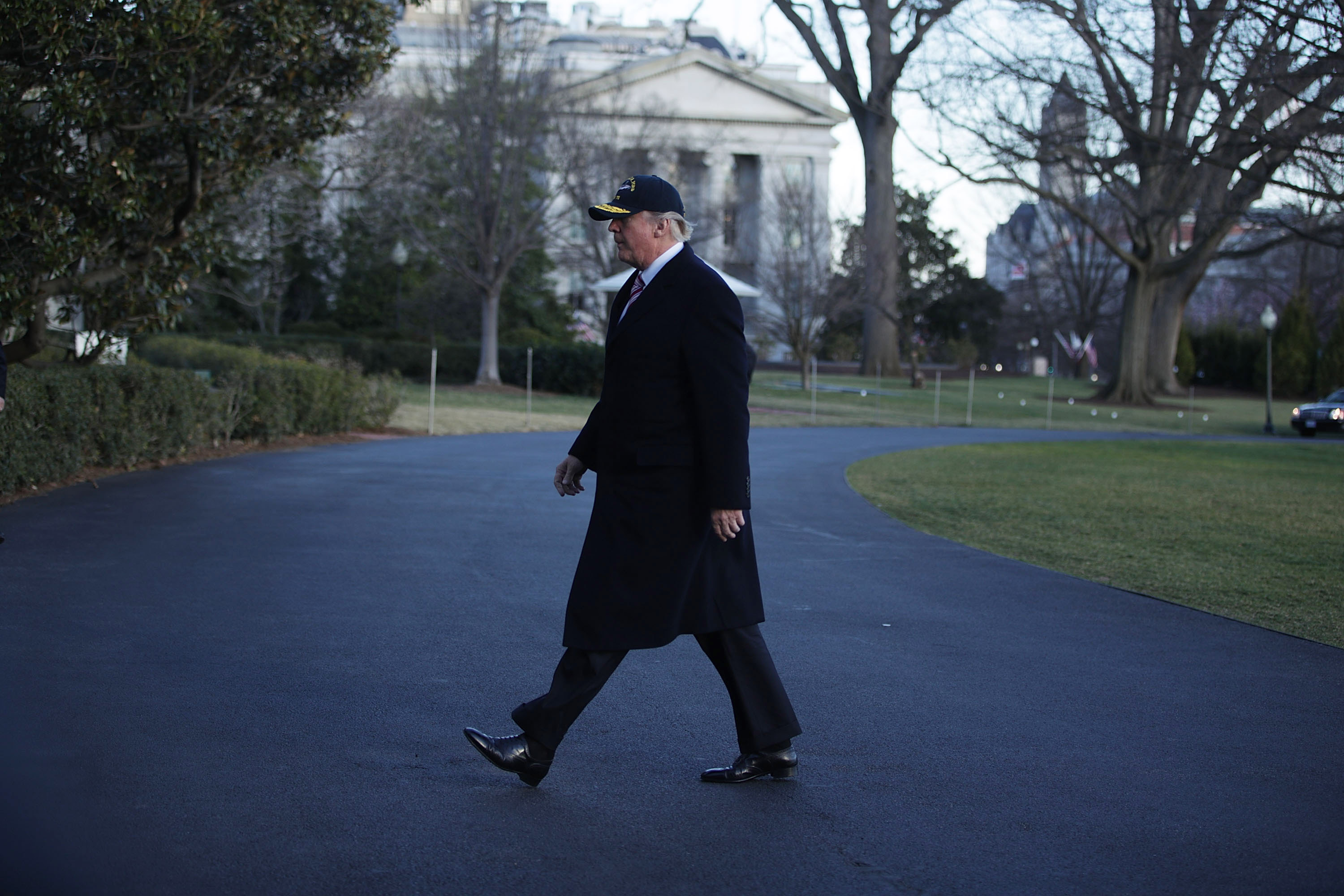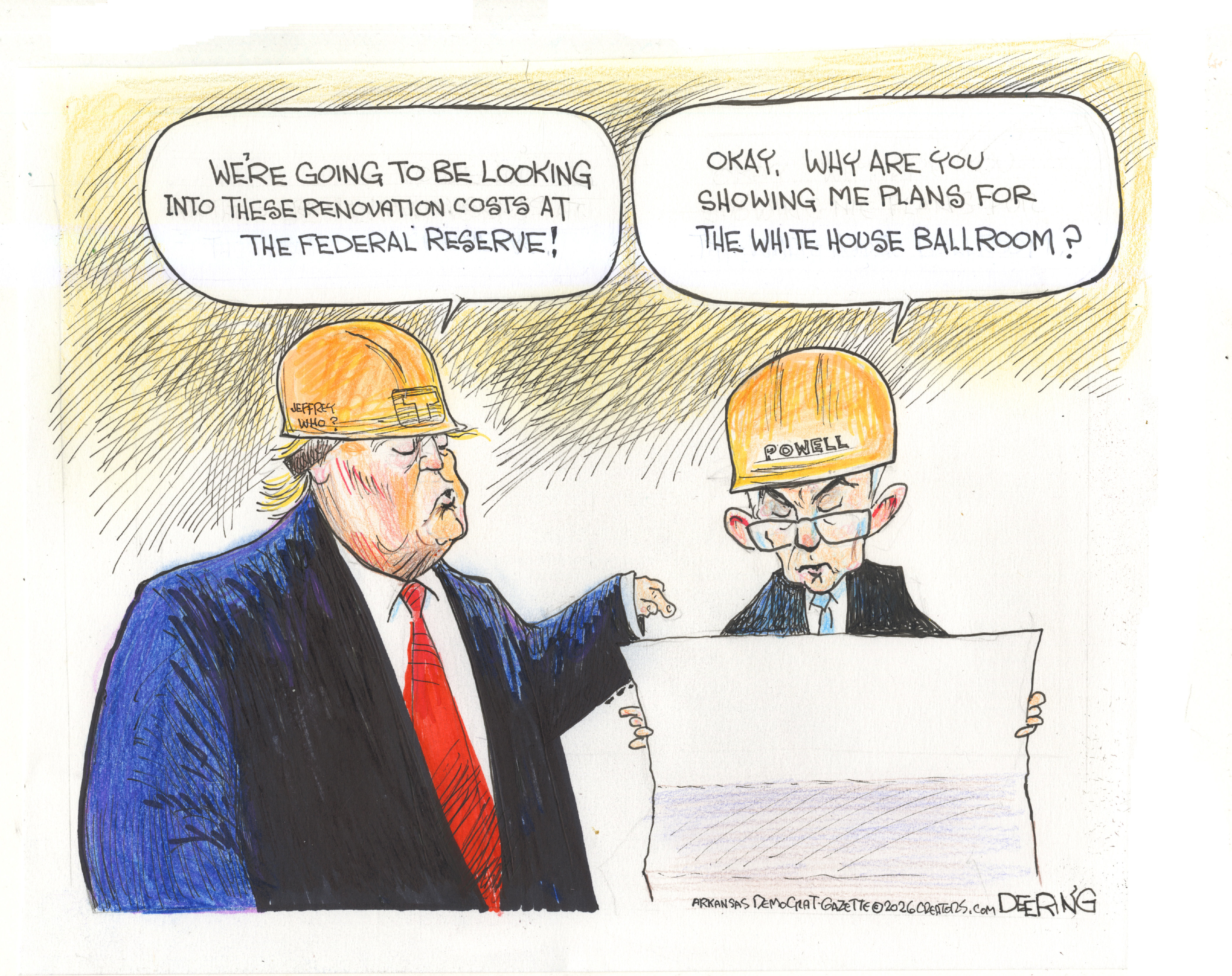10 things you need to know today: March 4, 2017
Trump accuses Obama of spying on Trump Tower, White House denies inappropriate Russia ties as six aides admit to meetings, and more


- 1. Trump accuses Obama of spying on Trump Tower
- 2. White House denies inappropriate Russia ties as six aides admit to meetings
- 3. Sessions to respond to additional Senate inquiry over Russia meetings
- 4. Janet Yellen signals Fed will likely increase interest rates this month
- 5. DHS reportedly considers separating women and children detained at U.S. borders
- 6. FBI arrests suspect accused of threatening Jewish community centers
- 7. China slows military budget increase to 7 percent
- 8. Trump exempts Keystone pipeline from U.S. steel rule
- 9. Uber uses a technology called 'Greyball' to avoid police
- 10. Nintendo stock jumps on release day for new Switch console
1. Trump accuses Obama of spying on Trump Tower
President Trump on Saturday made a four-tweet accusation that former President Obama spied on him in the run-up to the 2016 election. "Terrible! Just found out that Obama had my 'wires tapped' in Trump Tower just before the victory. Nothing found. This is McCarthyism!" Trump began, suggesting that Obama — a "Bad (or sick) guy!" — could be prosecuted for illegal surveillance if there was a "good lawyer" to make a "great case." Trump's tweetstorm appears to be inspired by the Thursday evening show of right-wing talk radio host Mark Levin, who argued Obama orchestrated a "silent coup" on Trump using "police state" tactics. A Breitbart article on Friday published a timeline to support Levin's allegation, emphasizing a Heat Street report of an October FISA court request from the Obama administration "focused on a computer server in Trump Tower suspected of links to Russian banks. No evidence [was] found — but the wiretaps continue[d], ostensibly for national security reasons." The Breitbart piece concludes the Obama team monitored Trump and then relaxed information sharing rules to foster embarrassing leaks.
2. White House denies inappropriate Russia ties as six aides admit to meetings
Six of President Trump's aides have admitted to speaking with Russian ambassador Sergey Kislyak last year, stoking further suspicion about the Trump campaign's ties to Russia. Additional meetings came to light following reports that Attorney General Jeff Sessions, then serving in the Senate and as a Trump campaign surrogate, met twice with Kislyak during the election. On Thursday, the White House revealed ousted national security adviser Michael Flynn and senior adviser Jared Kushner both met briefly with Kislyak in an "introductory meeting" in December, and it was also reported that three of Trump's former national security advisers spoke with Kislyak at the Republican National Convention in July. Trump and his team have repeatedly denied any inappropriate contact with Russia.
The Week
Escape your echo chamber. Get the facts behind the news, plus analysis from multiple perspectives.

Sign up for The Week's Free Newsletters
From our morning news briefing to a weekly Good News Newsletter, get the best of The Week delivered directly to your inbox.
From our morning news briefing to a weekly Good News Newsletter, get the best of The Week delivered directly to your inbox.
3. Sessions to respond to additional Senate inquiry over Russia meetings
Attorney General Jeff Sessions has pledged to respond to additional questions from Senate Democrats about his two meetings with Russian ambassador Sergey Kislyak during the election. Sessions' written replies will be submitted to the Senate Judiciary Committee Monday; he declined Democrats' request to attend a hearing for live questioning. This new inquiry comes after Sessions' announcement he would recuse himself from any investigation of the Trump campaign after news of his contact with Kislyak broke. Sessions says the meetings were strictly in his then-senatorial capacity, though he reportedly used Trump campaign funds to pay for the trip during which one meeting occurred. If he met with Kislyak as a campaign surrogate, Sessions' under-oath statements to the Senate Judiciary Committee in January would be false.
4. Janet Yellen signals Fed will likely increase interest rates this month
Federal Reserve chair Janet Yellen indicated Friday an increase in the federal interest rate is on the horizon. "At our meeting later this month, the committee will evaluate whether employment and inflation are continuing to evolve in line with our expectations, in which case a further adjustment of the federal funds rate would likely be appropriate," Yellen said. Economists have sensed the economy is nearing the end of its rebound period after the 2008 financial crisis, meaning continued low interest rates could push growth into unsustainable territory. The Federal Open Market Committee's meetings are scheduled for March 14 and 15.
A free daily email with the biggest news stories of the day – and the best features from TheWeek.com
The Financial Times The New York Times
5. DHS reportedly considers separating women and children detained at U.S. borders
The Department of Homeland Security is "actively considering" changing its policy against separating women and children caught illegally crossing the U.S. border, three officials told Reuters. Though no decision has been made, the proposal suggests allowing the government "to keep parents in custody while they contest deportation or wait for asylum hearings," while putting their children "into protective custody ... until they can be taken into the care of a U.S. relative or state-sponsored guardian," Reuters reported. The current policy, implemented under former President Barack Obama, states women and children can be held at family detention centers for a maximum of 21 days before being released and allowed to stay in the U.S. while their cases are heard.
6. FBI arrests suspect accused of threatening Jewish community centers
The FBI on Friday arrested a man believed to be behind at least eight recent bomb threats against Jewish community centers. Juan Thompson, 31, allegedly made the threats "as part of a sustained campaign to harass and intimidate" a woman he used to date, authorities said. He has been charged in New York for cyberstalking by making bombs threats against Jewish community centers in the woman's name. Thompson is a former employee of The Intercept, but he was fired in January 2016 after he was caught fabricating information. Intercept editor Betsy Reed in a statement called Thompson's alleged actions "heinous." The threats are part of a broader rise in anti-Semitic acts nationwide; at least 100 Jewish community centers and schools in the U.S. have received bomb threats since January.
7. China slows military budget increase to 7 percent
Beijing announced Saturday its military spending will grow by just 7 percent in 2017, the slowest rate of growth for the Chinese defense budget in years. Last year's increase of 7.6 percent was the first single-digit hike after nearly two decades of annual double-digit growth. The news was shared with a statement from the Chinese legislature that the military is exclusively defensive in nature and functions as a force for stability in Asia. This move comes despite political pressure to further increase Chinese defense spending in response to President Trump's proposed 10 percent addition to the U.S. military budget.
8. Trump exempts Keystone pipeline from U.S. steel rule
President Trump on Feb. 23 vowed to U.S. Steel CEO Mario Longhi the Keystone XL pipeline would be constructed from "steel made in this country and pipelines made in this county." But on Friday, following pressure from Keystone XL's developer, TransCanada, the White House announced the pipeline is exempt from the "buy American" policy. The project is excluded from Trump's executive order calling for "all new pipelines, as well as retrofitted, repaired, or expanded pipelines" inside the U.S. to use U.S. steel "to the maximum extent possible," a White House representative said, because "the Keystone XL pipeline is currently in the process of being constructed, so it does not count as a new, retrofitted, repaired, or expanded pipeline."
9. Uber uses a technology called 'Greyball' to avoid police
Uber uses a technology called "Greyball" to block law enforcement attempting sting operations from hailing a ride, The New York Times reported Friday. Officials' accounts in the app can be identified by Uber in multiple ways, including by creating a "geofence" around authorities' offices and "Greyballing" anyone who frequently opened and closed the app in that region. Once a user was Greyballed, Uber "served up a fake version of its app that was populated with ghost cars," the Times reports, so they cannot successfully schedule a ride. "This program denies ride requests to users who are violating our terms of service," Uber said in a statement, "whether that's people aiming to physically harm drivers, competitors looking to disrupt our operations, or opponents who collude with officials on secret 'stings' meant to entrap drivers."
10. Nintendo stock jumps on release day for new Switch console
Nintendo Co. on Friday launched its newest gaming console, Switch, a hybrid system that lets gamers flip between playing at home on the TV and gaming on the go. After concerns about the adaptable device's viability caused Nintendo's stock to decline for four straight days ahead of Friday's release, on launch day Nintendo's stock "rose as much as 5.1 percent, also the biggest gain in a month," Bloomberg reported. Nintendo is cautiously optimistic about Switch after its last release, Wii U, was widely panned. So far reviews of Switch — which resembles a tablet with half a video game controller attached to each side — are mostly positive.
Bloomberg The Associated Press
Bonnie Kristian was a deputy editor and acting editor-in-chief of TheWeek.com. She is a columnist at Christianity Today and author of Untrustworthy: The Knowledge Crisis Breaking Our Brains, Polluting Our Politics, and Corrupting Christian Community (forthcoming 2022) and A Flexible Faith: Rethinking What It Means to Follow Jesus Today (2018). Her writing has also appeared at Time Magazine, CNN, USA Today, Newsweek, the Los Angeles Times, and The American Conservative, among other outlets.
-
 Political cartoons for January 17
Political cartoons for January 17Cartoons Saturday’s political cartoons include hard hats, compliance, and more
-
 Ultimate pasta alla Norma
Ultimate pasta alla NormaThe Week Recommends White miso and eggplant enrich the flavour of this classic pasta dish
-
 Death in Minneapolis: a shooting dividing the US
Death in Minneapolis: a shooting dividing the USIn the Spotlight Federal response to Renee Good’s shooting suggest priority is ‘vilifying Trump’s perceived enemies rather than informing the public’
-
 10 things you need to know today: January 24, 2024
10 things you need to know today: January 24, 2024Daily Briefing Trump closes in on nomination with New Hampshire win over Haley, 'Oppenheimer' leads the 2024 Oscar nominations, and more
-
 10 things you need to know today: January 23, 2024
10 things you need to know today: January 23, 2024Daily Briefing Haley makes last stand in New Hampshire as Trump extends polling lead, justices side with US over Texas in border fight, and more
-
 10 things you need to know today: January 22, 2024
10 things you need to know today: January 22, 2024Daily Briefing DeSantis ends his presidential campaign and endorses Trump, the US and Arab allies push plan to end Gaza war, and more
-
 10 things you need to know today: January 21, 2024
10 things you need to know today: January 21, 2024Daily Briefing Palestinian death toll reportedly passes 25,000, top Biden adviser to travel to Egypt and Qatar for hostage talks, and more
-
 10 things you need to know today: January 20, 2024
10 things you need to know today: January 20, 2024Daily Briefing Grand jury reportedly convened to investigate Uvalde shooting response, families protest outside Netanyahu's house as pressure mounts for hostage deal, and more
-
 10 things you need to know today: January 19, 2024
10 things you need to know today: January 19, 2024Daily Briefing Congress averts a government shutdown, DOJ report cites failures in police response to Texas school shooting, and more
-
 10 things you need to know today: January 18, 2024
10 things you need to know today: January 18, 2024Daily Briefing Judge threatens to remove Trump from his defamation trial, medicine for hostages and Palestinians reach Gaza, and more
-
 10 things you need to know today: January 17, 2024
10 things you need to know today: January 17, 2024Daily Briefing The US strikes Houthi targets in Yemen a third time, Trump's second sex defamation trial begins, and more
